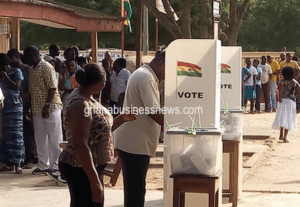Ghana’s democracy largely reduced to electoral democracy – Dr Aggrey-Darko
 Dr Evans Aggrey-Darkoh, the Acting Chief Director of the Ministry of Parliamentary Affairs, has said despite significant progress, Ghana’s democracy has been largely reduced to electoral democracy.
Dr Evans Aggrey-Darkoh, the Acting Chief Director of the Ministry of Parliamentary Affairs, has said despite significant progress, Ghana’s democracy has been largely reduced to electoral democracy.
He said serious gaps exist in the nation’s effort at promoting justice, efficiency in public service, liberty, equality and the common good.
Dr Aggrey-Darkoh was speaking at a Dialogue with Civil Society Organisations on the theme: “Interrogating Parliament’s Contribution to the Consolidation of Ghana’s Democracy thus far: The Perspective of CSO.”
The Ministry of Parliamentary Affairs as part of its mission to deepen inclusiveness in a participatory democracy recognised the importance of civil society in the democratic process, especially in providing a vital link between citizens and the State.
The Dialogue is being organised with the view to examining the performance of Ghana’s Parliament, since 1993 in order to identify the strengths and weakness and provide a way forward into the next twenty-five years of Ghana’s democratic journey.
He said if Parliament would work diligently, the quality of democratic outcomes would improve significantly.
The Acting Chief Director said it is the contention of the Ministry that they ought to interrogate the contribution of Ghana’s Parliament to Ghana’s democracy since the inception of the Fourth Republic in 1993.
“We do so with the view to seek to improve the general quality of lives of Ghanaians,” he added.
He said the Ministry is confident that a well-functioning Parliament would promote four cardinal peculiarities including rule of law, multiparty political system, supremacy of civilian rule and its regular succession and redistributive socio-economic justice.
He said the interrogation of the workings of Parliament ought to be done by all democracy seeking institutions, indicating that “this is why civil society organisations are the focus of this engagement.”
He said a well-functioning civil society organisations is essentially underpinned by civil liberties, especially freedom of expression, freedom of Association and assembly and freedom of the press.
Dr Aggrey-Darkoh said when given the vent to operate, Civil Society could enhance citizen’s opportunities to influence their own situation in life and to break free of the vicious circle of poverty.
He said civil society organisations in the country have over the years served as “universities without students” by promoting human rights, democracy and good governance, civic education and the production of basic and welfare services to Ghanaians.
The following are the sub-themes for the focus of the dialogue: the institutional framework of Parliament and its effects on the performance of its functions, the nature, function, strengths and weakness of committee system of Parliament, the Speaker of Parliament as an independent umpire and the contributions of Parliament to the consolidation of Ghana’s democracy.
Source: GNA
